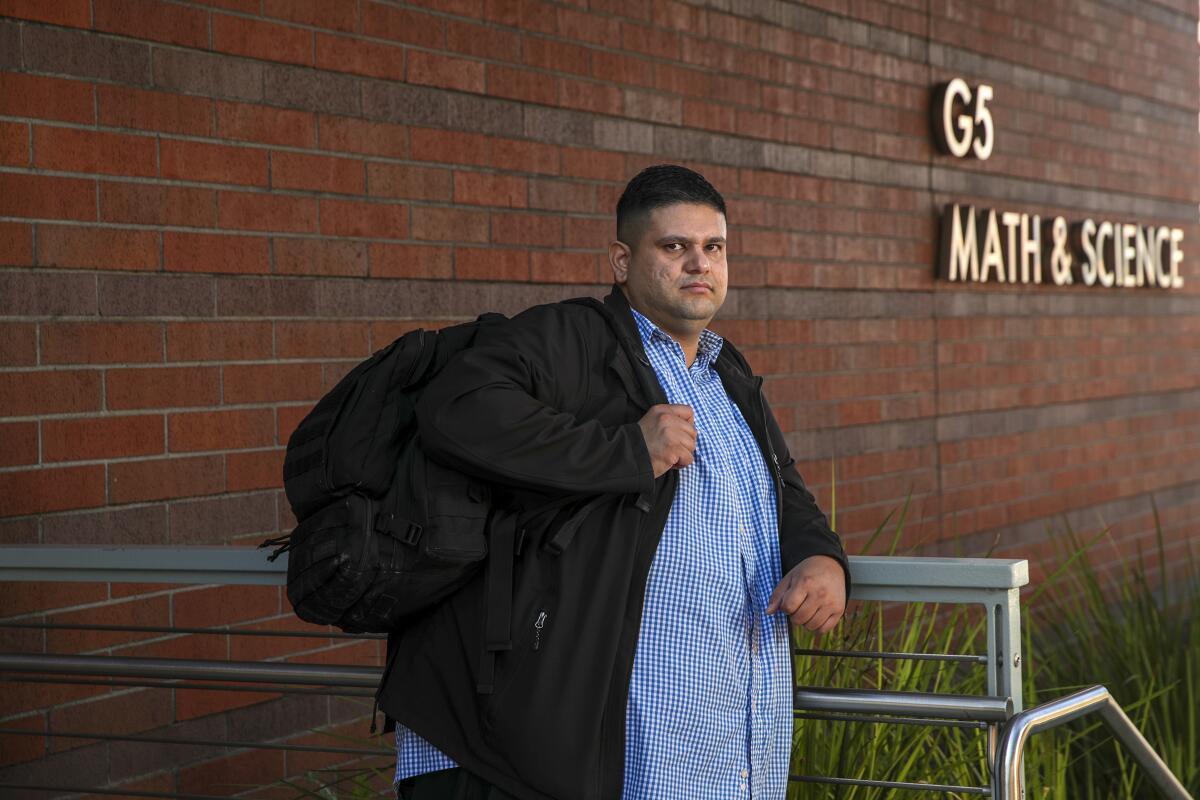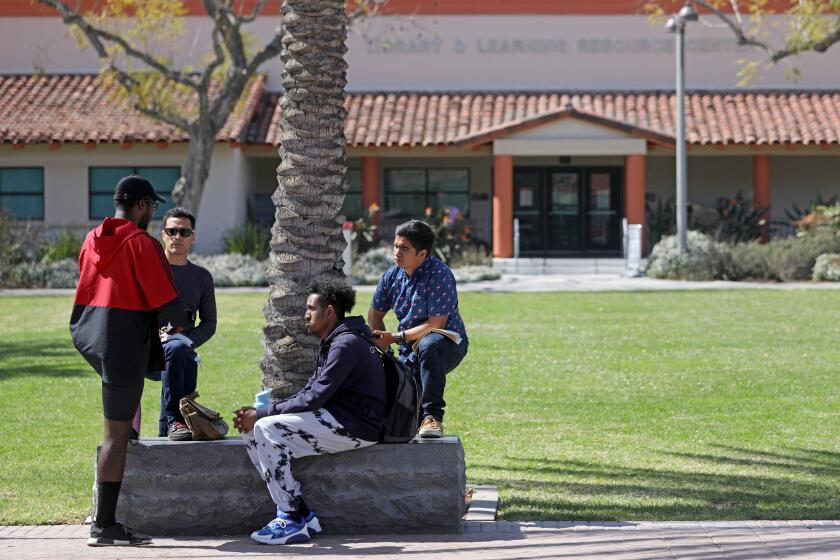More than half of California community colleges refuse to drop dead-end remedial courses

- Share via
The first in his family to attend college, Paul Medina was increasingly frustrated by his inability to get into a college-level math class.
Medina first enrolled in remedial courses at East Los Angeles Community College in 2005 after an assessment test placed him three classes below college level. The courses did not count toward a degree or transfer credits. He passed the first two, pre-algebra and high school-level algebra, but got stuck in intermediate algebra. Twice, Medina dropped that class in frustration, giving up on college math for a few years, unsure he would ever pass the classes needed for a degree.
But a 2017 California law that sought to nearly eliminate remedial classes allowed Medina to skip intermediate algebra; he enrolled in a higher-level statistics course that offered intense tutoring, and he had no trouble passing.
“I see the benefits of not having remedial classes,” said Medina, 35, who has made academic progress toward three different associate degrees, while working, sometimes full time. Such courses can “discourage you and leave you behind. I saw a lot of students like myself get discouraged.”
Despite a California law that requires community colleges to direct students like Medina away from remedial education, more than half of the state’s 116 campuses have not made the change, which took effect in 2019.
At least one in five introductory math courses is remedial at 69 California community colleges, according to the California Acceleration Project, a faculty group supporting a bill to strengthen the 2017 law to force the holdouts to reduce those numbers. The bill passed the California Assembly on Wednesday and goes to the state Senate.
While the original law required colleges to direct students into classes where they are “most likely to succeed,” it was vague on how colleges should do that. Some colleges have even increased remedial offerings since the law took effect, the California Acceleration Project says.
Advocates who want to largely do away with remedial education in California and in a handful of other states — including New York, Florida, Tennessee and Georgia, all of which have made changes — say many students can handle college-level work if given the opportunity, especially when they get help from tutors or supplemental classes. Students shouldn’t have to pay for classes that don’t count toward a degree and that they most likely won’t pass, these advocates say.
The community college law took effect shortly after California State University, the largest four-year system in the nation, eliminated placement exams and remedial classes in 2018, saying that they were costly and largely failed to help students achieve their educational goals.
New research suggests colleges’ policies around unpaid balances may be contributing to an enrollment decline while doing lasting financial harm to students.
Despite early success, just seven California community colleges had implemented the 2017 law “with fidelity” by 2021, according to the state chancellor’s office, meaning that the vast majority had yet to achieve the law’s goals of better student progress toward degrees. Colleges were allowed to implement the changes as they wished, a chancellor’s office spokesman said.
Before the new policy, in California and elsewhere, half the nation’s community college students were placed in remedial classes in math or English, according to Complete College America. Fewer than a quarter of them passed those courses and went on to complete college-level math and English classes.
In California in 2020, after the law went into effect, 46% of first-time math students in college-level classes passed those classes, up from just 24% in 2018, according to the Public Policy Institute of California.
Despite those positive results, some community college administrators are reluctant to eliminate remedial classes and often argue that students who feel unprepared academically should have the choice whether to start out in such courses, which don’t count toward a transfer to a four-year college or university.
Some students just aren’t ready for college math or English, they say.
Even “if you don’t know basic arithmetic, you are now in a transfer-level course from Day 1,” said Jamey Nye, a deputy chancellor for the four-college Los Rios Community College District near Sacramento. “Faculty are very concerned with what to do with students who fail this course.”
Algebra hadn’t been part of Lorrie Parks’ life since she left high school more than four decades ago. Now 56 and trying to finish an elusive college degree, Parks was embarrassed to find she wasn’t ready for basic math at Ventura College in California.
“I’m supposed to go into linear equations next fall. How’s that going to work?” said Parks. She’s turned to private math classes to get up to speed. “It’s like I’ve just learned to read.”
Most colleges prevent students from taking a course more than three times. And students who run into academic trouble risk wasting time and money on a class they can’t pass, which experts say often leads them to give up on college altogether.
Resistance to eliminating remedial classes among California community college instructors is so strong that the statewide faculty association is opposing the new legislative bill and coordinating a letter-writing campaign against it.
Thousands of students failed college-level courses after the changes took effect in 2019, said Evan Hawkins, the faculty association’s executive director.
California Community College students can decide whether they want a letter grade, a pass/no pass credit — a transcript lifeline of sorts designed to prevent students from dropping out.
“To us that’s alarming,” he said. “Students are failing these courses at much higher levels than they were before.”
But statewide data from the chancellor’s office show that the increase in students failing the higher-level courses is simply due to the fact that so many more students are taking them. And those failures are more than offset by the thousands fewer who are failing remedial courses. Completion rates in college-level math classes were up at every community college except one — Cuyamaca College near San Diego — in 2019-20, the first school year the new law was in effect, according to data from the state chancellor’s office.
Reform advocates say schools can do more. They note that many schools fail to explain to students that they likely could handle college-level classes, especially with what’s called a corequisite model, which gives underprepared students additional support or resources, such as tutors and “boot camps,” to make up gaps in their learning. If remedial courses are offered, these advocates say, too many students will choose them instead of the corequisite courses.
That strategy — giving students the choice — prevents many students from completing college, said Katie Hern, a co-founder of the California Acceleration Project.
“They legitimately believe that students should still have the ‘choice’ to enroll in a college-level course, but they put their thumb on the scale by offering so many remedial classes,” said Hern, who teaches English at Skyline College south of San Francisco. “They’re continuing to steer students toward these classes while saying, ‘No, no, it’s their choice.’ ”
A California law firm, Public Advocates, last year urged the Los Rios Community College District to stop directing students into remedial courses, arguing that the practice disproportionately hurts Black and Latino students. At least one student, lawyers wrote, said the college never told him that he had a right to take more advanced courses.
Los Rios administrators ultimately agreed, and now say they are removing all remedial courses for the upcoming fall term.
“Math faculty are saying that’s crazy, that we need to offer remedial courses,” said Nye, the deputy chancellor. “But it wasn’t working, and it was a dead end for many students. We need to address the equity issues.”
Instructors do struggle, however, to find a balance between dead-end remedial classes and higher-level ones that might be too difficult, causing students to drop out.
Adrián Trinidad, who studied how race and power have affected the implementation of remedial reforms for his doctoral dissertation at USC, says traditional placement tests have pushed too many students into remedial courses, especially students of color. Community college instructors need to do a better job of making college more welcoming and effective for those students, Trinidad said, by understanding individual needs and giving students the right support.
This story was produced by the Hechinger Report, a nonprofit, independent news organization focused on inequality and innovation in education.
More to Read
Sign up for Essential California
The most important California stories and recommendations in your inbox every morning.
You may occasionally receive promotional content from the Los Angeles Times.












